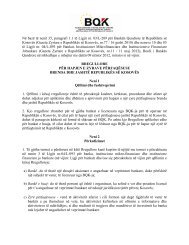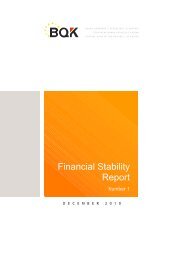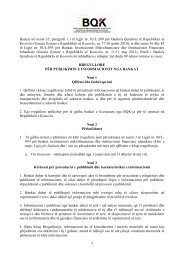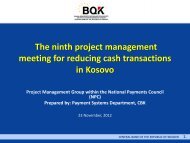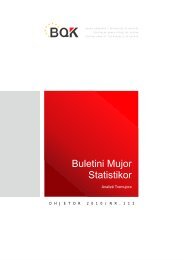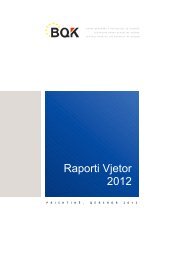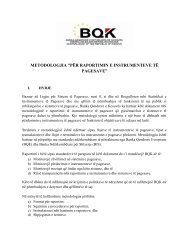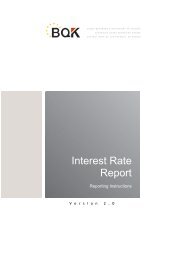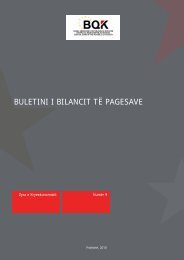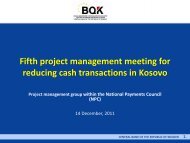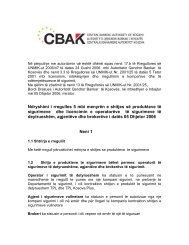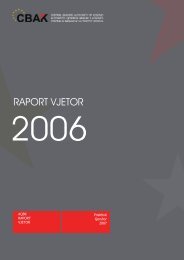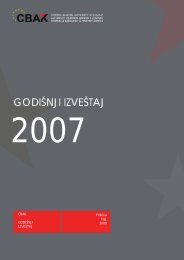Annual Report 2010 03 August 2011 - Banka Qendrore e ...
Annual Report 2010 03 August 2011 - Banka Qendrore e ...
Annual Report 2010 03 August 2011 - Banka Qendrore e ...
Create successful ePaper yourself
Turn your PDF publications into a flip-book with our unique Google optimized e-Paper software.
<strong>Annual</strong> <strong>Report</strong> <strong>2010</strong><br />
CBK<br />
Greece and Portugal. Returns from investments serve as a good benchmark and at the<br />
same time as a good point to compare the financial instruments of EU countries with<br />
Germany, which sustained a considerable expansion that was more significant during the<br />
last quarter of <strong>2010</strong>. While return from investment in short-term securities of Germany<br />
reached the point of 0.40 percent, those of Portugal culminated at 4 percent. In November<br />
<strong>2010</strong>, return from investment 10-year credit default swaps of Ireland increased to 9<br />
percent. This is because the main countries of Europe, Germany and France agreed that<br />
private investors should pay for risks taken during investments in Ireland to avoid the<br />
entire barded fall on EU taxpayers. In July <strong>2010</strong>, all state and corporate credit default<br />
swaps in Ireland were sold due to a risk of infection of the other European countries.<br />
EONIA (Euro Overnight Index Average) started relatively low in the first part of <strong>2010</strong>, but<br />
it had a growing trend during the third and fourth quarters, making overnight investments<br />
of CBK portfolio generate satisfactory profits. In October <strong>2010</strong>, the decline of EONIA driven<br />
by turbulences in European debt market was compensated by a considerable growth in the<br />
end of the year. One-week and one-month interest rates given by corresponding banks have<br />
also recorded a growing trend, making short-term investments the most favorable category<br />
of asset invested in CBK portfolio. Average EONIA for <strong>2010</strong> was 0.44 percent, while it<br />
reached the highest point of 0.87 percent on 30 September <strong>2010</strong>.<br />
European Central Bank (ECB) kept maintaining key refunding ratio of 1 percent<br />
throughout <strong>2010</strong>. Keeping short-term ratios relatively low, ECB created simultaneously<br />
conditions for an accommodating monetary policy in the region. This oriented investors<br />
towards capital markets that were more liquid and created other conditions for the credit<br />
default swaps prices to continue declining. Establishment of the financial assistance<br />
mechanism, respectively the European Financial Stability Facility, in May <strong>2010</strong>, which<br />
aimed at assisting the Euro-zone countries in emergency liquidity needs, it created a<br />
stability in the market making the returns from investment in securities of Portugal, Spain<br />
and Ireland start decreasing in the end of <strong>2010</strong>. Liquidity injection in European market to<br />
save Ireland and preparation to intervene in Portugal created a temporary security in<br />
money market. Private investors and institutions benefited from the instable situation,<br />
buying Portuguese and Greek securities which provided high returns.<br />
During this period, CBK invested a small part of assets in debt market in short-term<br />
instruments, generating profits and maintaining a low level of market risk and failure risk.<br />
Commercial banks of EU countries outside the public debt crisis had a stable<br />
performance and satisfactory returns throughout <strong>2010</strong>. Among the category with<br />
sustainable performance are included banks of Austria, Germany, France, Netherlands and<br />
Scandinavian countries. Considering their risk return profile, investments in short-term<br />
deposits of CBK were concentrated in the safest banks in this region. Average time horizon<br />
for investments in short-term deposit in <strong>2010</strong> was 9 days.<br />
5.4. Interbank payment System<br />
Interbank Electronic Clearing System<br />
Development of an efficient and safe system for domestic payments, as a key standard of<br />
the financial infrastructure, is one of the CBK primary functions. Interbank Electronic<br />
Clearing System (IECS) operated by CBK is the only interbank payment system in the<br />
Republic of Kosovo. IECS functions as a hybrid system which enables interbank channeling<br />
of a wide range of payment instruments.<br />
80 |



